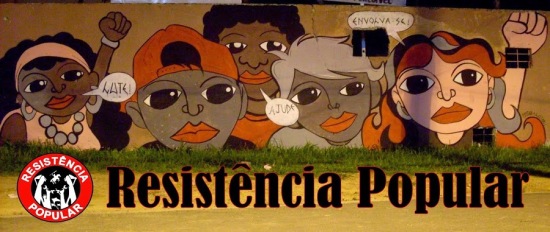As working class activists, we should share experiences with – and learn from – working class struggles in other places. The ruling class organises worldwide to exploit and dominate our class. So we need to organise resistance to defend our interests everywhere. And we can only benefit from arming ourselves with lessons from different working class movements.
An important example of working class resistance from which we, in South Africa, can draw inspiration is the Brazilian Resistência Popular (Popular Resistance). This organises with unions, student and neighbourhood movements, and it promotes mobilisation and organisation based on grassroots democracy, direct struggle, and solidarity across the broad working class. It exists in various cities, and stresses the importance of people organising themselves, from the bottom up, outside of the parliamentary system, and against the economic and political elites.
The movement draws inspiration from another Latin American movement, the Zapatista Army of National Liberation (EZLN) in Mexico, better known as the “Zapatistas.” The Zapatistas organised an important rebellion against neo-liberalism on 1 January, 1994, in the Chiapas province. Although they were contained by the state’s army, they secured control over a range of areas.
In these areas, ordinary villagers have governed themselves outside of the state for the last twenty years; the Zapatistas act as servants of these villages, not as a ruling army. Self-governance in these areas includes new ways of dealing with crime and anti-social behaviour education; communities develop their education curricula, and run their own schools and health clinics.
The Zapatistas are named after Emiliano Zapata, a Mexican revolutionary from the 1910s. Zapata was partly influenced by anarchism, and insisted that “A strong people doesn’t need a strong leader”.
Resistência Popular has a similar slogan: “Build a strong people”. What this means is that organising should stress building movements and militants that do not rely on a few great leaders. The role of leadership here is to showing other people that they ALSO have the potential to lead, organise and take action. To “build a strong people” means to build a people where everyone can, at one time or another, play an active and leading part.
This is very different to the style of leadership we have often seen in South Africa, Zimbabwe and elsewhere, where people look to leaders to save them, and leaders look to people to serve them. As we have seen, this top-down division between leaders and led, based on hero worship and a lack of accountability, undermines democracy and initiative; it is a recipe for the rise of self-enriching politicians and repressive dictators.
For Resistência Popular, leaders are not an authority outside or above the people but are part of the people such that, as the great anarchist Mikhail Bakunin said:
“Each is an authoritative leader and in turn is led by others. Accordingly there is no fixed and constant authority, but continual exchange of mutual, temporary and, above all, voluntary authority and subordination … Hierarchical order and promotion do not exist, so that the executive of yesterday can become the subordinate of tomorrow. No one rises above the others and, if he does rise, it is only to fall back again a moment later, like the waves of the sea forever returning to a salutary level of equality”.
“Build a strong people”: this is an idea whose time has come.

